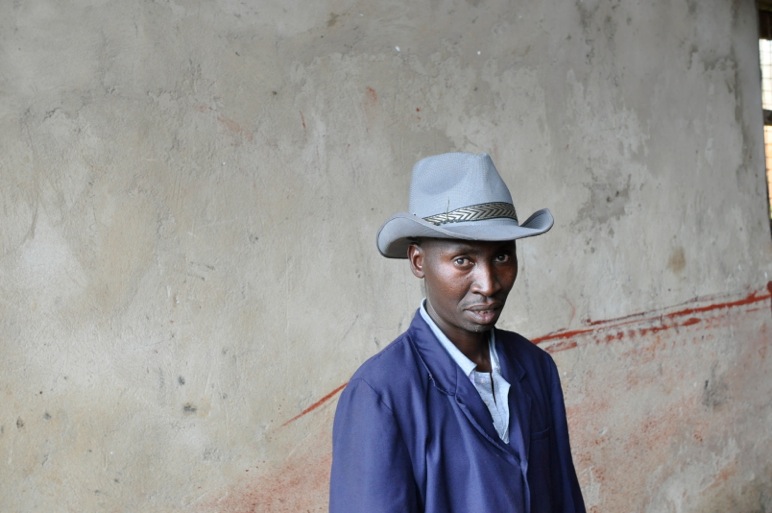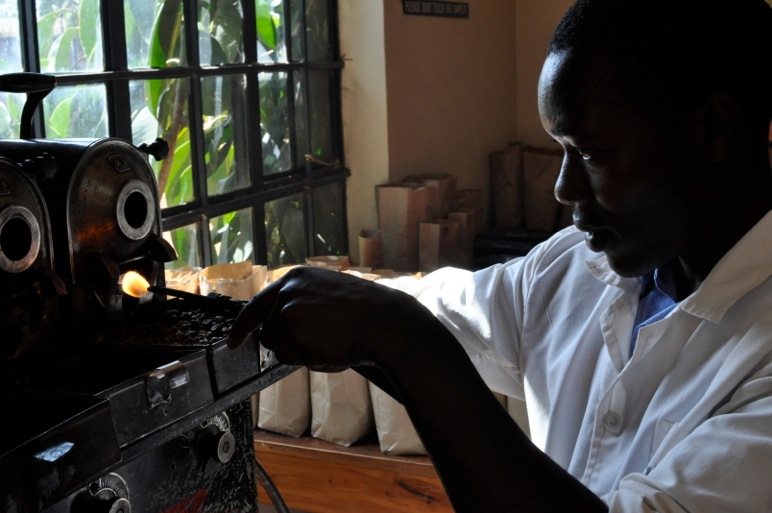One of the few truths in coffee is that cupping is key! If you want to understand a coffee you need to taste it. If, however, you can’t cup the coffee yourself, work with coffee cuppers you trust. Part of this trust comes from being confident not only in the other’s palate but, just as crucially, in his ability to be able to communicate, meaningfully, the essence of the coffee's character and flavors.
My trip to Kenya this week was for the purpose of finding the best lots of 2011/2012 and to bring them to market. Our goal is to get what we think are the best lots of this year’s harvest to roasters anticipating fantastic Kenyan coffees. My mission for this trip was to cup as many coffees as possible but this work was focused; we are not “starting from scratch” every time we come.
Years of experience have really taught us how to limit our search at this origin. At the same time, we are always open to surprises and are ready for new partners and flavors. Kenya has a well-established and well functioning auction system. The coffees are unique in flavor profile, which is very difficult to replace. As a result, Kenyan coffee has its own price dynamic in the international coffee market that, even if it follows the NYSE to some extent, will ultimately be sold with solid premiums on top of "the C".
The system at the Kenyan Coffee Auction is refreshingly transparent in its communicating where coffees come from, its systematic organization of coffee by screen quality (such as size and physical attributes), and in its practice of rewarding cup quality/sensorial attributes. (Note: at the time of this writing, I am in Ethiopia on a similar mission but the state of the auction system here is in a sorry state. More on this in a future post.)
Most coffee producers in Kenya are so-called small holders. Each producer’s total volume might only be a few bags, thus hundreds of farmers, when living in the same area, are likely to be members of a cooperative that is marketing and selling coffee on the whole community's behalf. Each cooperative usually runs several "factories" (i.e. processing and washing stations) where each producer delivers cherry from his farm. Sometimes a producer chooses to deliver to the closest factory but certain producers prefer delivering to a different factory, due to differing management practices. The usual reason for choosing one factory over another is based on the prices a given factory manages to obtain for its cherries.
Good management, hence a good factory, will not allow for unripe or unevenly matured cherries. This is because accepting such cherry damages the potential to receive optimum prices for everyone concerned. We pride ourselves in knowing the factories we buy from pride themselves on ensuring their community of members deliver only red and mature cherries. In Kenya’s market make-up, cherry price is directly linked to cup quality. Still, one must cup for himself!
In Kenya, a cooperative is a democratically run organization with producers acting as both members and as representatives of the governing board. One key function of the board is to nominate a marketing agent: a body/organization/company that retains a license to sell the co-op’s/client's coffee at the highest possible price. This works in both parties’ interests. Normally a coffee lot is sold at auction, but it can also be sold outside auction if the co-op and marketing agent believe they can get an even better price outside auction through selling directly to a customer. That is where we come into the picture.
At this stage (when coffee has been delivered and processed at the factory), coffee is not ready to cup. The marketing agent, at least in our case, partners with a company that does the dry milling of the coffee still in parchment. These parties also grade, check quality, and record volumes of each coffee grade (i.e. AA, AB, PB, etc.). Finally, they prepare samples for potential buyers. If the marketing agent chooses to sell the coffee at auction, which is generally the case, they need to present a "catalogue" of coffee lots in good time to the market, prior to auction. Auction takes place every Tuesday during the season, beginning on the 1st of October. Catalogues are prepared and presented each auction week by the various agents. In addition to providing a catalogue, each agent must provide samples to potential buyers. Potential buyers must have a buying license.
One such buyer is Dormans, based in Nairobi, and we usually go to them in order to sample coffees we are interested in buying. Dormans has a reputation for retaining good cuppers. We like them, we trust them, and they rigorously search for the best coffees to offer us. In the peak of the buying/auction season they will screen thousands of coffees each week. When we arrive we are presented with just a few hundred of these. These coffees are representative of the best presented to the market. We spend days and days screening these lots in search for what we actually end up buying. If necessary, we'll re-roast coffees to ensure each has been given a fair shot. We also re-cup the “winning lots” many times.
I prefer to cup blind when decision-making is the agenda. As it so happens, coffees from many of the same factories stand-out on the table, as though old friends are re-visiting. These friends include Karagoto, Tegu, Ngunguru of Tekango co-op, Gichathaini, Karagocho, Ndaroini of Gikanda co-op, amongst others. These stand out, time after time, year after year. But there are more! As with a good group of friends, new members sometimes join. We are always welcoming of new and exciting coffees and are buying new ones even more than usual, now that we are supplying more roasters excited about great, diverse and unique coffees.
Dormans has a license to buy at the auction, but as it also happens, they are sister company to a marketing agent/mill where coffee is processed after it finishes drying at the factories and leaves the resting bins. This means we can test coffees way before auction. I always like to go to the mill (CKCM in this case) anyway, to get closer to the action. Ernest at CKCM, who we mentioned in the last post, awaits us each visit and sets up tables of coffees he thinks will be of interest, in addition to coffees from factories we already buy from (due to their consistent and indisputable merits).
In the last few years we have taken advantage of the possibility of buying coffees directly from, or at least in understanding and agreement with, the cooperatives. The cooperative is the seller of the coffee and always wants the highest price possible in recognition of: 1. The hard work of quality oriented farmers and factories, 2. Cup quality, and 3. In recognition of the current price of coffees of "similar quality" being sold at auction in Nairobi. Negotiating the price of the best coffees is important to a buyer eager to secure lots before it goes to auction where somebody else might buy it. The price offered has to be high enough for the cooperative to ensure it won’t be sold better at auction, which can, in turn, discourage quality-minded producers. As a matter of fact, all the best coffees are sold this way, thus the only way to get hold of these lots is to be present at origin while they are coming from the mill, which is now. And we were there to accomplish this!
The question is always: when is the best time to visit to cup? Well, we have chosen to go early and to come back in time. The crop was a month late this year, thus I was there about a month later than usual. Last year, I must say, we managed to get hold of some pretty good stuff. The timing just felt (and was) right.
This year we will buy more coffee, spread from various stages of the crop, from various factories, and even from the same factory but from various representative dates of the season. We want to bring the freshest coffee possible to an eager and freshness-keen market as soon as possible. For the next shipment after this one, just a few weeks later, we are selecting and expecting even more of the good stuff. Why wait longer and settle for less?
We want to buy direct (i.e. as directly as is possible; in Kenya’s case, outside auction). As soon as we have settled prices with our suppliers, we will announce what they are, as well as being totally clear and transparent about other costs necessarily brought into the equation of bringing in each kilo of coffee; costs for all the processing and handling that coffee goes through. The more work put that is put into a coffee, the higher the cup quality potential. Our coffees will be vac-packed and shipped as soon as possible.
Watch for the last Kenya post in this series. We will go through the coffees we’ve chosen, in detail. To be continued...
Robert





